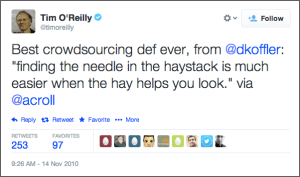How deep does crowdsourced problem-solving go?
March 27, 2014 Leave a comment
On the recent post, Why crowdsourcing works, Michael Fruhling of BFS Innovations asked:
A couple of related questions: for most current crowd sourced problem solving endeavors, how “deep” does the problem solving routinely go? And do the results meaningfully change if incentives are introduced?
It was a good, thoughtful question. I answered it in the comments there, and wanted to make the answer into its own blog post, below.
 The depth of the problem-solving in a crowdsourcing endeavor is wholly dependent on:
The depth of the problem-solving in a crowdsourcing endeavor is wholly dependent on:
- The question that is asked
- The engagement of the question sponsor
- Who is asked to participate
- Why people would want to participate
A few points on each of those factors.
Question that is asked
As you can imagine, the question impacts the depth of problem-solving. In-depth question = in-depth problem-solving. The more specific the question, the better the quality of people’s contributions. “Specific” here doesn’t mean asking a tactical, low-level question. Rather, it means clearly delineating what is sought in a way that people can relate to .
Engagement of the question sponsor
Crowdsourcing works best (obviously?) when solving a specific problem that someone has. People will respond to the question with different concepts and questions. The feedback of the question asker (aka “sponsor”) provides the back-n-forth that breaks through initial responses to build a deeper response.
Who is asked to participate
Getting cognitive diversity is the key, as described in the post. But also, you want people who have some connection and interest in the question. Think holistically about that. Upstream, downstream, adjacent fields. Problem-solving depth requires matching a question with people who will give a damn.
Why people would want to participate
The question of “why” is closely related to the preceding question of “who”. If a question’s answer potentially affects a person, there is built-in motivation to participate: steer things in a way that makes sense to you. This works well for internal employee-based crowdsourcing. However, there are certainly questions where the personal impact may be less acute. Other incentives come in to play. Engagement with a sponsor – with attendant acknowledgments, thank you’s, feedback – are great incentives. Opportunities to see an idea through is a powerful stimulant. And prizes have great power. Prizes work best when they establish an opportunity to see an idea one is passionate about become real (e.g. investment funds). Or when the question is not one that directly impacts you. In such a case, they are compensation for putting your brainpower to work problem-solving.
I’m @bhc3 on Twitter, and I’m a Senior Consultant with HYPE Innovation.



